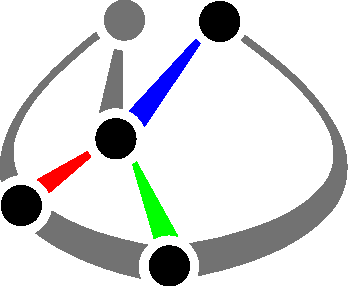This package implements various data structures and helper methods for manipulating spatial transformations using CasADi variables in Python. The library interface is partially based on the Scipy spatial module.
- Code: https://github.com/cmower/spatial-casadi
- Documentation: https://cmower.github.io/spatial-casadi/
- PyPI: https://pypi.org/project/spatial-casadi
- Issues: https://github.com/cmower/spatial-casadi/issues
There are three main data structures: Rotation, Translation, and Transformation. The following showcases some of the main functionality of the library.
>>> import spatial_casadi as sc
>>> import casadi as cs
>>> cs.np.random.seed(10)
>>> euler = cs.SX.sym("euler", 3)
>>> sc.Rotation.from_euler('xyz', euler).as_quat()
SX(@1=2, @2=cos((x_2/@1)), @3=cos((x_1/@1)), @4=sin((x_0/@1)), @5=(@3*@4), @6=sin((x_2/@1)), @7=cos((x_0/@1)), @8=sin((x_1/@1)), @9=(@7*@8), @10=(@3*@7), @11=(@8*@4), [((@2*@5)-(@6*@9)), ((@2*@9)+(@6*@5)), ((@10*@6)-(@2*@11)), ((@2*@10)+(@6*@11))])
>>> r = sc.Rotation.random()
>>> r.as_quat()
DM([0.615982, 0.330883, -0.71489, -0.0038783])
>>> r.as_rotvec()
DM([-1.9304, -1.03694, 2.24037])
>>> r.as_matrix()
DM(
[[-0.241103, 0.40209, -0.883285],
[0.41318, -0.781003, -0.468312],
[-0.878152, -0.477867, 0.0221665]])
>>> r.as_euler('xyz')
DM([-1.52444, 1.07199, 2.09902])
>>> r.as_mrp()
DM([-0.613602, -0.329604, 0.712128])
>>> sc.Rotation.from_euler('x', 90, degrees=True).as_matrix()
DM(
[[1, 0, 0],
[0, 2.22045e-16, -1],
[0, 1, 2.22045e-16]])
>> r1 = sc.Rotation.random()
>>> r1.as_quat()
DM([0.625459, -0.724863, 0.267273, 0.109269])
>> r2 = sc.Rotation.random()
>>> r2.as_quat()
DM([0.00332548, -0.1353, 0.335557, 0.932247])
>>> (r1 * r2).as_quat()
DM([0.376374, -0.899524, 0.203617, -0.0879736])
$ pip install spatial-casadi
$ pip install spatial-casadi[test] # if you want to run the test scriptsIn a new terminal:
- Clone repository:
- (ssh)
$ git clone git@github.com:cmower/spatial-casadi.git, or - (https)
$ git clone https://github.com/cmower/spatial-casadi.git
- (ssh)
- Change directory:
$ cd spatial-casadi - Ensure
pipis up-to-date:$ python -m pip install --upgrade pip - Install from source:
- (main library)
$ pip install . - (when you want to also run the test scripts)
$ pip install .[test]
- (main library)
- Install
spatial-casadifrom source and ensure you install thetestpackages (see previous section). - Change directory:
$ cd /path/to/spatial-casadi - Run tests:
pytest
The documentation is hosted here. However, if you want to build it yourself, then follow these steps.
In a new terminal:
- Clone repository:
- (ssh)
$ git clone git@github.com:cmower/spatial-casadi.git, or - (https)
$ git clone https://github.com/cmower/spatial-casadi.git
- (ssh)
- Change directory:
$ cd spatial-casadi/doc - Install doxygen:
$ sudo apt install doxygen - Build documentation:
$ doxygen - View documentation:
- In a browser, open
html/index.html - Build pdf (requires LaTeX)
$ cd latex$ make- Open the file called
refman.pdf
- In a browser, open
If you use spatial-casadi in your work, please consider citing the following.
@software{Mower2023
title = "Spatial CasADi: A Compact Library for Manipulating Spatial Transformations",
author = "Christopher E. Mower",
year = "2023",
url = {https://github.com/cmower/spatial-casadi},
}If you have any issues with the library, or find inaccuracies in the documentation please raise an issue. I am happy to consider new features if you fork the library and submit a pull request.

